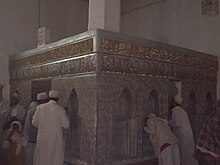
Back أروى بنت أحمد Arabic اروى بنت احمد ARZ Arwa bint Ahmad German Arŭa al-Sulajhi Esperanto Arwa al-Sulayhi Spanish اروی صلیحی Persian Arwa French Arwa al-Sulayhi ID Arwa al-Sulayhi Portuguese Арва бинт Ахмад Russian
Arwā bint Aḥmad ibn Muḥammad ibn Jaʿfar ibn Mūsā Aṣ-Ṣulayḥī | |
|---|---|
 Mausoleum of Queen Arwa inside Queen Arwa Mosque, Jibla | |
| Born | 1048 CE (440 Hijri) |
| Died | 5 May 1138 (aged 89–90) |
| Resting place | Queen Arwa Mosque, Jibla |
| Other names | As-Sayyidah Al-Ḥurrah (Arabic: ٱلسَّيِّدَة ٱلْحُرَّة, lit. 'The Noble Lady') Al-Malikah Al-Ḥurrah (Arabic: ٱلْمَلِكَة ٱلْحُرَّة or Al-Ḥurratul-Malikah (Arabic: ٱلْحُرَّةُ ٱلْمَلِكَة, lit. 'The Noble Queen') Malikat Sabaʾ Aṣ-Ṣaghīrah (مَلِكَة سَبَأ ٱلصَّغِيْرَة, "Little Queen of Sheba") |
| Known for | Being a long-reigning Queen of Yemen and Islam |
| Predecessor | Asma bint Shihab |
| Successor | (Sulayhid Dynasty abolished) |
| Spouses | |
| Children | Abd al-Imam Muhammad Abd al-Mustansir Ali Fatimah Umm Hamdan |
| Father | Ahmad ibn Muhammad |
| Part of a series on Islam Isma'ilism |
|---|
 |
|
|
Arwa al-Sulayhi (Arabic: أَرْوَى بِنْت أَحْمَد ابْن مُحَمَّد ابْن جَعْفَر ابْن مُوْسَى ٱلصُّلَيْحِي, romanized: Arwā bint Aḥmad ibn Muḥammad ibn Jaʿfar ibn Mūsā aṣ-Ṣulayḥī), (c. 1048 – c. 1138) was a long-reigning ruler of Yemen, firstly as the co-ruler of her first two husbands and then as sole ruler, from 1067 until her death in 1138. She was the last of the rulers of the Sulayhid Dynasty and was also the first woman to be accorded the prestigious title of Hujjah in the Isma'ili branch of Shia Islam, signifying her as the closest living image of God's will in her lifetime, in the Ismaili doctrine. She is popularly referred to as As-Sayyidah Al-Ḥurrah (Arabic: ٱلسَّيِّدَة ٱلْحُرَّة, lit. 'The Noble Lady'), Al-Malikah Al-Ḥurrah (Arabic: ٱلْمَلِكَة ٱلْحُرَّة or Al-Ḥurratul-Malikah (Arabic: ٱلْحُرَّةُ ٱلْمَلِكَة, lit. 'The Noble Queen'), and Malikat Sabaʾ Aṣ-Ṣaghīrah (Arabic: مَلِكَة سَبَأ ٱلصَّغِيْرَة, lit. 'Little Queen of Sheba').
As female sovereign, Arwa has an almost unique position in history: though there were more female monarchs in the international Muslim world, Arwa and Asma bint Shihab were the only female monarchs in the Muslim Arab world to have had the khutbah, the ultimate recognition of Muslim monarchial status, proclaimed in their name in the mosques. She founded several mosques, the most prominent of which is Queen Arwa Mosque.
Arwa was the first queen regnant in the Muslim world. Through her title of hujjah, she is the only Muslim woman to ever wield both political and religious authority in her own right.
Her political career can basically be divided into four parts. The first spans the period from her marriage to al-Mukarram Ahmad in 1065 until the death of her mother-in-law Asma in 1074. During this period, there is no evidence that she held any political power. The second begins after Asma's death, and Ahmad began to delegate all power to Arwa at that point until his 1086 death. Third, after his death, Arwa wielded power as queen mother to her son Abd al-Mustansir, and she was also ordered by al-Mustansir to marry Saba' al-Sulayhi (although never consummated) for legitimacy and then was nominally consort even if she held the real power. Finally, after Saba's death in 1097 or 1098, Arwa reigned as sole queen in her own right, with no male nominally in charge.